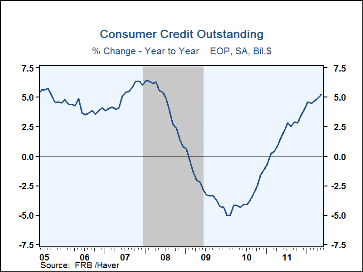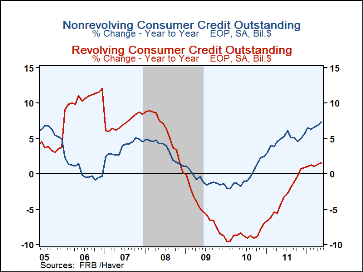 Global| Jul 10 2012
Global| Jul 10 2012U.S. Consumer Credit Growth Ramps Up
by:Tom Moeller
|in:Economy in Brief
Summary
Monthly growth in consumer credit picked up to its fastest this year during May. The Federal Reserve reported yesterday that credit grew $17.1B (AR, 5.3% y/y) after a $10.0B rise in April, revised from $6.5B. A $10.0B increase had [...]
Monthly growth in consumer credit picked up to its fastest this year during May. The Federal Reserve reported yesterday that credit grew $17.1B (AR, 5.3% y/y) after a $10.0B rise in April, revised from $6.5B. A $10.0B increase had been expected by Action Economics. The gain lifted the y/y rise to 5.3%, its fastest since June 2008.
Usage of revolving credit, improved the most. The $8.0B rise (1.5% y/y) compared to a $3.5B April decline. Savings institutions lending rose 8.7% y/y and commercial bank lending increased 1.9% y/y. Credit union lending gained 4.5% y/y while pools of securitized assets rose 1.1% y/y.
Non-revolving credit loans, which account for roughly two-thirds of total borrowing, pulled back in May to a $9.1B seasonally adjusted rate (7.3% y/y). Loans from the federal government grew 30.1% y/y, credit union borrowing rose 3.4% y/y and commercial bank lending rose 2.0%. Savings institutions borrowing fell 18.2% y/y while pools of securitized assets were off 5.4%.
During the last ten years, there has been a 52% correlation between the y/y change in credit outstanding and the change in personal consumption expenditures, although the correlation recently has weakened considerably. The credit figures are the major input to the Fed's quarterly Flow of Funds accounts for the household sector.
The consumer credit data are available in Haver's USECON database. The Action Economics figures are in the AS1REPNA database.
| Consumer
Credit Outstanding (M/M Chg, SAAR) |
May | Apr | Mar | Y/Y | 2011 | 2010 | 2009 |
|---|---|---|---|---|---|---|---|
| Total | $17.1B | $10.0B | $12.8B | 5.3% | 4.0% | -1.1% | -4.3% |
| Revolving | 8.0 | -3.5 | 3.6 | 1.5 | 0.9 | -7.0 | -8.7 |
| Non-revolving | 9.1 | 13.5 | 9.2 | 7.3 | 5.7 | 2.5 | -1.4 |
Tom Moeller
AuthorMore in Author Profile »Prior to joining Haver Analytics in 2000, Mr. Moeller worked as the Economist at Chancellor Capital Management from 1985 to 1999. There, he developed comprehensive economic forecasts and interpreted economic data for equity and fixed income portfolio managers. Also at Chancellor, Mr. Moeller worked as an equity analyst and was responsible for researching and rating companies in the economically sensitive automobile and housing industries for investment in Chancellor’s equity portfolio. Prior to joining Chancellor, Mr. Moeller was an Economist at Citibank from 1979 to 1984. He also analyzed pricing behavior in the metals industry for the Council on Wage and Price Stability in Washington, D.C. In 1999, Mr. Moeller received the award for most accurate forecast from the Forecasters' Club of New York. From 1990 to 1992 he was President of the New York Association for Business Economists. Mr. Moeller earned an M.B.A. in Finance from Fordham University, where he graduated in 1987. He holds a Bachelor of Arts in Economics from George Washington University.
More Economy in Brief
 Global| Feb 05 2026
Global| Feb 05 2026Charts of the Week: Balanced Policy, Resilient Data and AI Narratives
by:Andrew Cates








